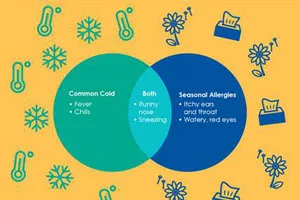What is the difference between a cold and the flu?
Sometimes it’s tricky to figure out if you have the common cold or influenza. After all, both are respiratory illnesses causing a number of similar symptoms like runny or stuffy noses, sore throats and coughs. But the cold and the flu are caused by different viruses. In general, a cold virus causes symptoms that are milder than a flu virus. Influenza can result in serious health problems such as pneumonia, bacterial infections and hospitalizations.

What symptoms are unique to the flu?
The flu typically causes a fever (although not always) or alternating feels of heat/chills, sore throat, cough, and body aches. There can sometimes be a runny or stuffy nose or headache and occasionally, nausea and diarrhea (especially in children). The only way to know for sure if you have influenza is to conduct a lab test. Since the solution to mild cases of both the flu and colds is typically to rest and drink fluids, a lab test is seldom necessary.
What about anti-viral medications?
If you are at high risk of serious flu complications, you should check with your doctor about getting a prescription for an anti-viral medication. These medications (available in pill, liquid and inhaled forms) can help lessen the severity of influenza (they do not work on the common cold) symptoms and studies show, on average, can decrease the length of the flu by one to two days. They can also prevent serious flu complications like pneumonia.
To be most effective, anti-viral medications should be given within two days of getting sick. Talk to your primary care doctor about whether or not you are a good candidate for anti-viral medication, if you should get the flu.
Should you really feed a cold and starve a fever?
Often times when you are sick, you don’t feel hungry. In the short term (over a few days), it’s not harmful to avoid eating if you don’t feel hungry, but we suggest you do eat if you are hungry. It’s more important to drink fluids regularly to stay hydrated since being sick can make you prone to getting dehydrated.
The above content is provided for educational purposes by Tufts Medical Center. For information about your own health, contact your physician.